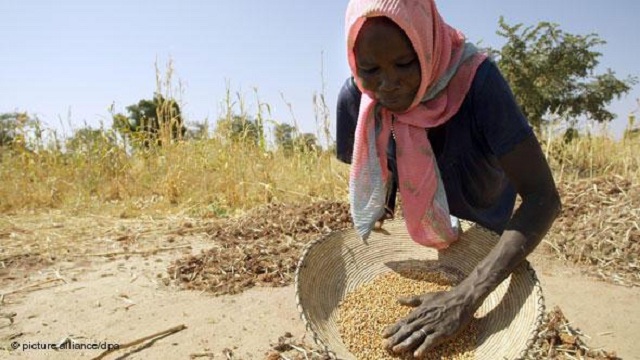Drought threatens to worsen agro – based economy of entire Southern region

Saul Gwakuba Ndlovu
ZIMBABWE’s agro-based economy is bound to be negatively affected by the drought facing the region South of the Zambezi River, a region comprising South Africa, Botswana, Namibia, Mozambique, Swaziland and Lesotho.
In addition to the shrinking economy caused by that meteorological factor, Zimbabwe is experiencing a high unemployment rate. That is coupled by an embarrassingly high level of corruption, some cases of which occur in the traffic section of the Zimbabwe Republic Police (ZRP).
Those are three major challenges Zimbabwe has to deal with most probably as priorities in 2016.
The national economy is not expanding to generate adequate employment to match the country’s population growth rate and the annual output of its educational institutions.
Zimbabwe’s economy is inevitably shrinking because of the drought. We as a nation do not seem to have learnt much, if anything at all, from past droughts, in spite of the phenomenon’s devastating frequency, and that our agricultural economic sector cannot be viable as long as it is dependent on rain.
Zimbabwe is by and large endowed with good agricultural soils, unlike its western neighbour Botswana much of whose soils have a high Kalahari sand content.
That geological characteristic also occurs in some parts of Matabeleland, Masvingo, Midlands and Manicaland regions where certain areas are semi-arid steppe suitable mainly for goats (browsers) and not cattle (grazers).
To mitigate droughts and render the national commercial agricultural sector economically attractive to potential investors, irrigation must be a publicly stated and well planned policy, with clearly identifiable government projects.
Irrigation projects could be based in every ward in the rural areas. While some projects could produce food crops for domestic consumption, some could target foreign markets.
The Government should certainly be more actively involved in such projects both at home through the appropriate ministries (water, agriculture, land, infrastructure etc), and abroad through trade attaches whose responsibilities should include seeking markets.
That responsibility should not be confined to getting markets for what Zimbabwean agricultural production is offering, but also identifying what else the foreign markets require, and our agricultural sector should be most strongly urged to supply.
Cattle ranching can be supported by the government by a three – pronged strategy: the production of fodder such as lucerne by means of irrigation, by means of easily accessible research stations to improve the quality and increase the national herd, and by investing in dairy and meat canning projects in the country.
Fodder production should aim also at communal lands as they carry a large number of cattle many of which are usually driven to commercial farms for grazing whenever it is exhausted in the communal lands, which it is always.
Government fodder – growing projects can be sited in virtually every rural ward as a Ministry of Agriculture responsibility. Excess production can be exported for the projects to sustain themselves sooner or later.
Properly managed cattle fodder projects can be expanded to produce poultry and piggery feeds.
Surely Zimbabwe cannot and should not fail to establish and successfully administer such projects in view of the large number of properly qualified personnel churned out by its 10 – plus universities yearly, and the terrible drought effects it has regularly experienced up to this very season.
This country has an incredibly large number of hydrologists, hydrographers and hydro-engineers, scientists who can lead and run such irrigation projects, while agronomists, agriculturists and soil scientists can actually be responsible for fodder and stock feed production.
Such projects could greatly mitigate the presently devastating drought effects on our livestock, and also increase the country’s financial resources by means of export earnings.
We now look at possible ways of building up Zimbabwe’s economy, (a social-economic process) that begins at the level of each family.
The best economic condition in each and every country is for an individual to be as economically independent as possible.
The next best condition is for each family to be free of poverty. That is difficult but not impossible to achieve. However, that is what obtains more or less in many nations the world over. Today’s relative poverty is a well-nigh global phenomenon, particularly in developing nations.
It is more serious in some politico-economic, socio-cultural, climate-ecological, geo-hydrological and geo-political regions and environments than in others. Zimbabwe’s economic situation is influenced by virtually all those environmental factors, some of which are external and others internal, some are natural and others human created.
Most Zimbabweans live in the rural areas. Of those who work or live in the country’s urban centres, some still maintain strong links with their rural origins. Zimbabwe’s overwhelming large part of its 390,580 Sq km comprises rural areas where most of the nation’s families eke out miserable livelihood from the soil.
A conservative estimate places Zimbabwe’s population at about 15 million of which at least nine million live in the rural areas. Urban centres share the reminder, that is, six million. Harare alone is carrying slightly more or less than two million, and Bulawayo slightly more than a million, and the rest is shared by the other towns and cities.
These people’s most important need is food of various types: meat, vegetables, grain, fruit, fish, honey, milk, mushrooms and potatoes.
Most of these can be produced much more easily and cheaply in the rural areas.
Very good examples are chickens, goats, sheep, pigs and, of course, cattle. If every family can keep about 60 fowls, and each of those birds being sold at $5, the family would be sure of raising between $200 and $300 more or less regularly or at least, occasionally.
In Zimbabwe, it is a traditional practice for every rural family or household to rear some chickens.
From chickens, the family can move an economic step higher by keeping goats and sheep.
Agreements can be entered into with some urban-based abattoirs for the professional slaughter of whatever those rural based families may wish to sell to butcheries with which supply contracts might have been made.
Goats, sheep and chickens are not as quickly or as easily negatively affected by drought as cattle. Goats are, in fact, 95 percent browsers, the exact opposite of cattle which are 95 percent grazers (with the exception of the Braham breed) and are thus much more vulnerable to droughts.
Sheep are able to endure longer spells of drought than most ruminants as they scratch the ground for couch grass roots while their bodies feed on fat stored in them during better seasons. That occurs quite often in the arid and karroo like regions in Southern Africa.
The sale of chickens in the rural areas is less cumbersome and less costly as many rural-based sole-traders will buy them to resell to urban-based butcheries or supermarkets. Rural boarding schools are also reliable consumers of well-bred chickens, so are mining centres. Poverty can be reduced by those projects which, if well managed, can develop into major industries with branches that can make and supply pillows, leather and glue, and in that way create employment for local communities.
Leadership is essential for such projects to be kick-started and to grow. The leadership should initially be at family level, move on to the entire village, then to the ward level, and finally that of parliamentary constituencies.
A major leadership characteristic is the ability and wish to motivate people. Functional literacy is, of course, necessary, virtually at all levels although much more so at village, ward and constituency levels.
Technical and professional guidance would be given by government agricultural extension personnel. Traditional leaders’ role is also essential to stabilise the projects, to give them respectability, legitimacy, geographical identity and belonging.
About the writer: Saul Gwakuba Ndlovu is a retired, Bulawayo – based journalist. He can be contacted on cell 0734 328 136 or through email. [email protected]









Comments